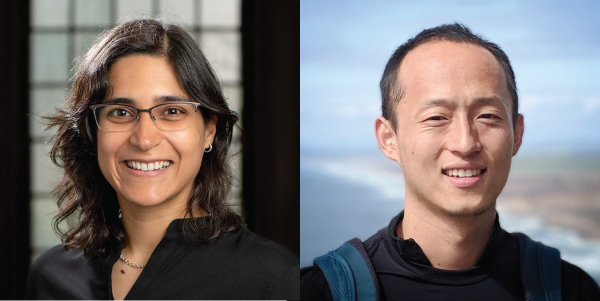Vazquez, He Receive Air Force Young Investigators Awards

Two Yale Engineering faculty members — Marynel Vazquez and Yu He — received awards from the 2023 Air Force Office of Scientific Research Young Investigator Research Program.

Through the Young Investigator Research Program, the Department of the Air Force fosters creative basic research in science and engineering, enhances early career development of outstanding young investigators and increases opportunities for the young investigators to engage in forwarding the Department of the Air Force, its mission and related challenges in science and engineering. Vasquez and He will each receive three-year, $450,000 grants to advance their research.
Marynel Vazquez, assistant professor of computer science, leads the Yale Interactive Machines Group, studying fundamental problems to enable group human-robot interactions (HRI). The award will help support her research to develop a way for robots to understand and apply the concept of fairness when they interact with humans. It also aims to explore how people perceive fairness in robots and how this affects their trust in robots. The project is based on a theory of fairness from organizational justice, which explains how people judge fairness, especially in situations that could harm someone's well-being.
To accomplish this, Vazquez will divide the research into three main thrusts:
- Modeling Welfare Threats: Vazquez will create a model for robots to recognize situations where someone might be harmed or their well-being is threatened. This will help test if the fairness theory works in human-robot interactions.
- Evaluating Conduct and Explaining Robot Actions: The second part will focus on how robots act and explain their actions. The goal is to make robots capable of explaining why they do certain things, which helps humans understand and trust them better.
- Studying Moral Transgressions and Social Categories: Vazquez will focus on how robots can understand moral mistakes and consider different social groups. This is about making robots act in ways that are more aligned with human values.
The project will test these ideas through online and in-person experiments where humans and robots share resources or work together. Overall, Vazquez aims to improve the way robots interact with humans, which could be especially useful for the Air Force to maintain technical superiority and increase future efficiency.
Yu He, assistant professor of applied physics, will use his award to gain insight and advance the understanding of magnetic materials.
Traditional magnetic materials like ferrites, and certain alloys, are fundamental in today's technology. These materials have strong, stable magnetic properties, but adjusting these properties is difficult. Recently, a new type of material called van der Waals magnets, particularly those in correlated metals (which means their electrons interact strongly with each other), have shown promise. These materials can be tuned more easily, and their magnetic properties can be electrically controlled. However, the exact reasons for these unique properties in van der Waals correlated metals are not fully understood.
To understand this, He will use various sophisticated techniques to analyze how the electronic structure, the arrangement of atoms, and the orientation of electron spins change when they tweak the material's composition and temperature. They're looking at how electron interactions, specific atomic properties, and the effects of atomic arrangement impact the material's tunable magnetism. They're also examining how certain kinds of atomic arrangements and microscopic strain within the material contribute to its overall magnetic strength and adjustability.
The goal of this research is to better understand the mechanisms behind the tunability of magnetism in these new materials. This understanding could lead to new ways to manipulate magnetism for future material development and in creating 2D devices.

